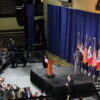Roar writer Dania Quadri interviews Dr Edward Stevens, the project manager of KCL’s Undisciplined Spaces initiative.
If 2020 has had a silver-lining, it is that is has reminded us of the power of community action in reaching out to those who are vulnerable. Whether it is supermarkets and cafes providing food to those who need it in the UK, Captain Sir Tom Moore fundraising for the NHS or volunteers supporting the most vulnerable during the pandemic, these stories appeal to us not just because of the good deeds being done, but because we value community togetherness.
It is thus timely that the Arts and Humanities Institute (AHRI) at King’s, in collaboration with the Institute for Community Studies, has launched a unique project, Undisciplined Spaces to research and tackle issues surrounding exclusion and marginalisation in local communities through creative research methods. Open to all first and second-year students at King’s, the creative research methods include artistic mediums such as digital diaries, poetry, storytelling, photography and many more.
I spoke with the project manager at Undisciplined Spaces and manager of the AHRI, Dr Edward Stevens, to discuss the project further.
Transcending boundaries through art
While explaining the rationale behind encouraging creativity in community research projects, Dr Stevens stated that ‘art and creativity allow the transcending of boundaries…and encourage interdisciplinary research…’ going on to say that if ‘the problems in the world are complex, one subject alone will not offer a solution.’
Students are reminded that while we may have segregated knowledge into disciplines to study them, the real world does not exist in such spheres. And so, there is a real benefit in conducting research across disciplines; in an undisciplined manner, so to speak.
Art also plays a crucial role in understanding the human experience. While biology may inform us of how stress caused by discrimination can increase the risk of physical and mental ailments, it is through art that we can understand how individual experiences of marginalisation are internalised and interpreted. This is important as this data can be collated and analysed to reach those who are being excluded. Thus, subjective experiences are treated as the core of the data. This is different to more objective forms of research that aim to establish ‘law-like generalisations.’
Storytelling and the power of creative methods
When asked about his own experiences of exclusion and marginalisation, Dr Stevens told me that as a young gay man, he struggled a great deal with ‘internalised homophobia.’ It was through storytelling and community initiatives that he felt he found his voice.
Indeed, storytelling is increasingly gaining a reputation as an extremely effective research method. It conveys information to the audience in a way research papers cannot. Storytelling evokes emotions and allows for ‘the analysis to take place on field, and not after.’ This is important for community research, as the researchers can analyse findings on site, asking people for interpretation of the data. If research is being done for a community, then it only makes sense to take their inputs in accessible ways.
Take the example of therapists using art to help Syrian refugee children cope with their trauma. Aside from therapeutic outcomes for the children, the pictures provided valuable data of what was going on in the children’s minds. This in turn informed therapists of areas they need to focus on, working with the children to promote well-being.
Beyond laboratories: redefining what research means
The Undisciplined Spaces project is a ‘co-production’ between students and their local communities. These ‘blurred boundaries between researcher and researched (e.g. community researchers researching their own communities)’ veers away from traditional researcher-participant dynamics, which makes it easier to access the marginalised and excluded.
While researching for this article and speaking to Dr Stevens about the word ‘research,’ I realised that my own understanding of what legitimate research data constituted was very narrow. Despite having formally researched the benefits of mental health stories in facilitating recovery, I subconsciously thought of it as a ‘lesser’ research. It just seemed like in the hierarchy of research, creative methodologies were second to rigorous scientific experiments. Unsurprisingly, one of the aims of Undisciplined Spaces is ‘challenging what research means.’
‘I know this sounds strange but I hope the project is uncomfortable for the students,’ Dr Stevens concluded smilingly. ‘If they find it challenging, that means they will learn a lot and have a truly invaluable experience.’
Undisciplined Spaces is now accepting applications. Deadline to apply is 30th November. More details and application here.

















